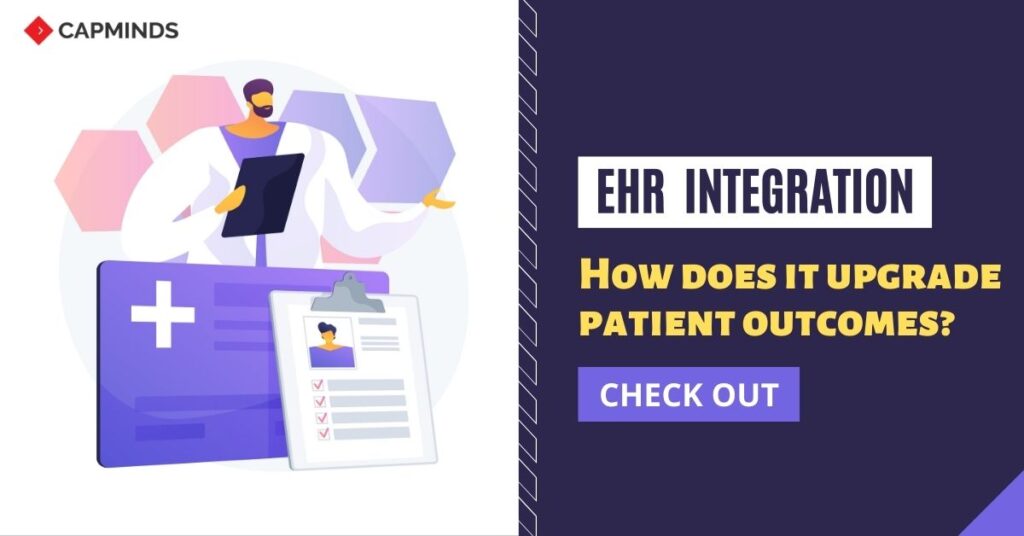EHR integration: How Does It Upgrade Patient Outcomes?
Patient outcomes are very important when measuring the quality of care provided by healthcare organizations. Optimizing patient outcomes results in better organizational effectiveness and EHR integration play a significant role in it.
Many healthcare organizations that are planning or working on increasing patient outcomes are transforming themselves into the adoption of Electronic Health Records (EHR). In this digital world, EHRs are now a virtual integral part of the healthcare continuum and the most widely authorized standard.
Exploiting this technology to its max requires genuine EHR integrations with supportive platforms and systems.
What Is EHR Integration?
According to a source, Electronic Health Records (EHR) integration is the process of enabling medical records to seamlessly be accessed across electronic software solutions. For practices this means medical records such as personal information, medical history, and more can be accessed easily across solutions.
Why EHR Is Important In Healthcare?
Electronic Health Records (EHR) is the easiest and smart system that consists of the health information of individuals that can be created, collected, managed, and revised by authorized physicians, clinicians, and other staff within a single healthcare organization.
It can benefit physicians, clinicians, and healthcare organizations substantially. It can smoothen the workflow of organizations, and boost the quality of care and safety provided to the patients.
But despite all these and many other advantages, the adoption of EHR is low. Many providers find EHR solutions to be harmful to their operations. This is majorly due to the misconception and the lack of proper knowledge about interoperability standards.
EHR integrations are important for smoothening the flow of clinical data and coordination between individual systems.
Interoperability And APIs
The general function of any integration is to facilitate proper interoperability between systems. EHR integration emphasizes the interoperability of different applications and platforms.
Interoperable systems work as an intermediary that collects and stores vital data from different systems and platforms. Many clinical organizations have considerably depended upon many providers for carrying out works relating to biometric monitoring, analytics, lab interfacing, and billing.
This interoperability between systems is made sure with a strong healthcare Application Programming Interface (API). An API can support the unidirectional or bidirectional transfer of data, based on the data relevance.
The Potential EHR Integrations
EHR adds value to healthcare organizations. Many systems when integrated with the EHR contribute well to any practice. Some of the potential EHR integrations are given below based on the individual workflow, kind of services offered, and patients’ needs.
Lab information system:
Integrating EHR with Laboratory Information System (LIS) solves problems regarding receiving complicated and time-consuming lab orders. Integrating helps streamline the whole lab process from ordering to admin moves easily.
This system allows practitioners to easily access and process lab results, quickly. This facilitates the reduction of errors and faster diagnosis with the uninterrupted transmission of data.
Medical device integration:
Medical Device Integration (MDI) deals with the integration of EHR in care. The management of tracking the biomedical devices was traditionally overlooked by monolithic internal systems. But now with the advent of EHR, operating rooms, ICUs, and other wards in hospitals could efficiently transmit and manage data around anesthesia carts, smart beds, ventilators, etc.
EHR makes recording and feeding readings easily through MDIs.
Telehealth:
Telehealth is the most trending healthcare solution now. Among other features, remote patient monitoring (RPM) became one of the famous features in medicine during the COVID-19 times.
The integration of telehealth and EHR will guarantee maximum virtual care to patients without any difficulties in the clinical workflow. This uninterrupted transmission of patient data will be ensured by an end-to-end bidirectional interface.
This integration allows practitioners to access and maintain patient data very quickly and easily manner. This integrated system facilitates dealings with diagnoses, prescriptions, and medications.
Get Yourself Equipped With The Smartest EHR Solution
Equipping yourself with world-class cloud-based EHR and practice management solutions are now made easy with CapMinds.
The CapMinds cloud-based EHR solution is built with easy-to-access advanced features to improve your practice’s clinical care. Its smart integrative EHR tools such as a convenient patient portal, advanced e-prescribing, clinical decision support, RCM, and automated billing solution with anytime mobile accessibility make it easier to provide quality care and a better patient experience.
Whether you’re a small practice or a large healthcare practice, our cost-effective EHR software helps to achieve greater success in the healthcare marketplace – not only today but also in the future.
“Let’s make your integrations and practice easier and more efficient, together”




